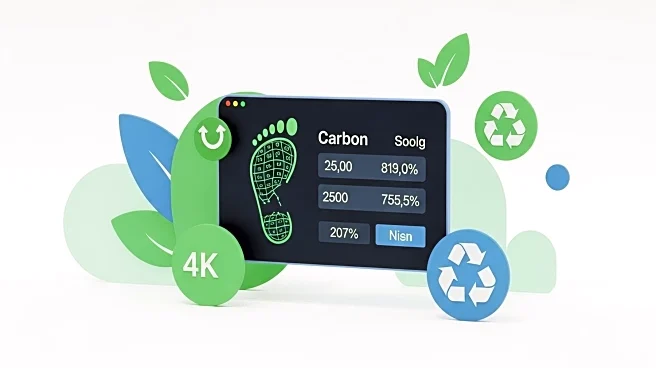What's Happening?
The International Cotton Advisory Committee (ICAC) has introduced a new application designed to calculate the carbon footprint of cotton production. This tool allows users, including farmers, researchers, and policymakers, to input data and estimate greenhouse gas emissions associated with cotton farming. The application provides detailed assessments based on various agricultural practices, such as soil types, seed usage, and transportation methods. It also evaluates carbon capture potential and emissions from land-use changes, offering insights into carbon sequestration related to cotton fiber management and regenerative agriculture practices. The tool is available as a web application and mobile app, supporting the global drive toward net-zero targets.
Why It's Important?
The introduction of the ICAC Carbon Footprint Application is significant as it provides a science-based tool for evaluating and reducing emissions in cotton production. This development is crucial for the agricultural sector, which faces increasing pressure to adopt sustainable practices and contribute to climate change mitigation. By enabling detailed assessments from individual farms to larger regions, the tool supports efforts to achieve net-zero targets and responsible carbon management. It empowers stakeholders to make informed decisions that enhance carbon sequestration and promote climate-smart agriculture, potentially leading to more sustainable cotton production practices globally.
What's Next?
The ICAC Carbon Footprint Application is expected to facilitate greater adoption of sustainable practices in cotton farming. As users begin to utilize the tool, it may lead to increased awareness and implementation of regenerative agriculture techniques, such as cover crops and reduced tillage. Policymakers and industry leaders might leverage the data provided by the application to set more ambitious carbon reduction targets and develop policies that incentivize sustainable farming practices. The tool's widespread use could also drive innovation in agricultural methods, contributing to the broader goal of reducing the environmental impact of cotton production.
Beyond the Headlines
The launch of the ICAC tool highlights the growing importance of technology in addressing environmental challenges within agriculture. It underscores the need for comprehensive data-driven approaches to manage carbon emissions effectively. The tool's ability to customize assessments based on diverse factors reflects the complexity of agricultural systems and the necessity for tailored solutions. This development may inspire similar initiatives across other agricultural sectors, promoting a shift towards more sustainable and climate-resilient farming practices.









